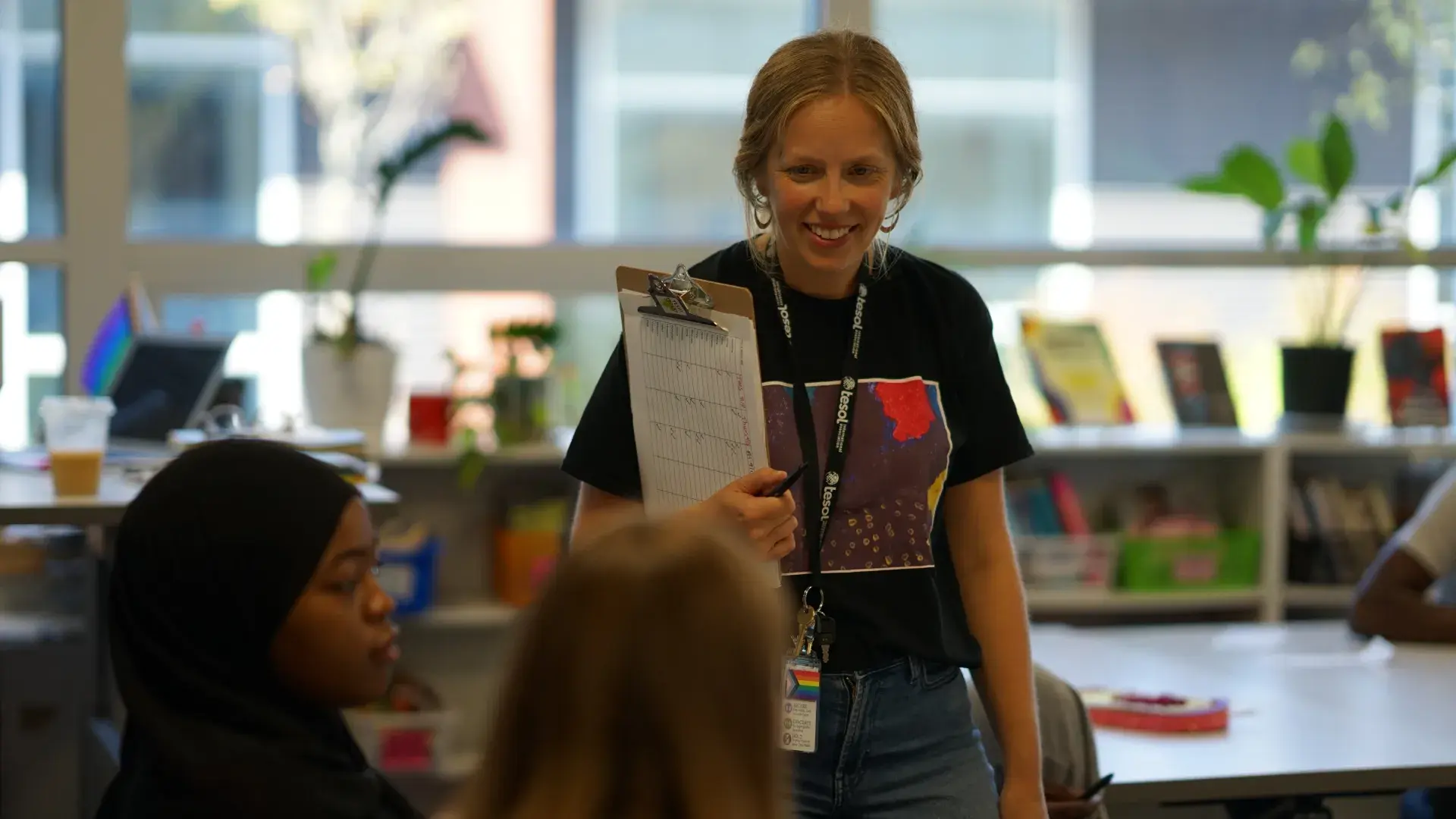
Caitlin MacLeod-Bluver enrolled in Advanced Study in Literacy & Language certificate program to fill “knowledge gap;” uses IHP lessons every day
When talking about MGH Institute alumni excelling in their fields, one generally thinks about nursing, physical and occupational therapy, genetic science, or physician assistants, but reading might not make the list when a health professions graduate school is involved.
It should now, thanks to Caitlin MacLeod-Bluver, who was just named the 2025 Vermont Teacher of Year. A 2017 graduate, MacLeod-Bluver earned a Certificate of Advanced Study in Literacy & Language, which she has put to effective use.
“I'm very humbled and I'm very honored,” said MacLeod-Bluver, who spent two years at the MGH Institute. “I feel like this work is incredibly sacred, and I work really hard at it. It means a lot to me, and teaching is truly a team sport. I’m very proud of what I’ve accomplished, but I couldn’t do it without a dedicated team of teachers.”
For the past six years, MacLeod-Bluver has been leading the reading curriculum at Winooski High School where she wears several hats as a history teacher, English teacher, and reading specialist.
“When I got to Winooski, I was hired as the reading specialist,” recalled MacLeod-Bluver. “They recognize the importance of reading for high school students, but they were still implementing outdated reading practices. So, I came in here happy to have this placement but had a lot of work to do in terms of helping teachers understand the science of reading and then helping redo a lot of our systems and structures around supporting students to read.”
Many of the tools used to do that came from her education at the MGH Institute, where MacLeod-Bluver enrolled while she was working with Boston Public high school students who didn’t know how to read.
“I didn’t have the skills to teach them,” said MacLeod-Bluver, a 14-year veteran whose career took her to Alaska for a year. “A lot of elementary education candidates and aspiring teachers learn more the science of reading and how to teach kids how to read, and high school teachers simply don't get that. So, I went to MGH because I wanted to learn more about how adolescent students learn how to read, and I felt like I had a large knowledge gap.
A knowledge gap filled with initiatives and approaches, all of which are used every day.
“The best practices for teaching reading, such as the scope and sequence from MGH Institute — I still use that all the time,” said MacLeod Bluver. “So really, the step-by-step directions and the rules. I use so much of my learning from MGH IHP around helping kids understand more themes and chunking words and understanding multisyllabic words. I have the tools to really pull small groups of kids and give them the one-on-one or small group instruction that they need. I have the assessment data from MGH IHP to really help inform best practices for working with these students.”
Because 60% of MacLeod-Bluver’s students are second-language learners, building culturally rich and affirming environments for students to learn in is critical.
“I fully affirm students’ identities and I value their native languages,” said MacLeod-Bluver. “I see their heritage languages as an asset, and I try to bring that into the classroom — all of this has to exist first before I can dive into really helping kids learn how to read. I pride myself on creating lots of opportunities for kids to fully express themselves and find their own voice in a classroom. Even if that same student is testing multiple grade levels below on any reading assessment, seeing these kids as smart geniuses with stories to tell, and with writing that should be published. It’s finding ways to bring that out and not seeing their low reading scores as a deficit, but rather thinking about all the assets that they're bringing into the classroom.”
“I am proud to recognize Caitlin as Vermont’s Teacher of the Year,” said Interim Secretary of Education Zoie Saunders in a news release. “Caitlin’s ability to inspire, challenge, and uplift her students makes her an exceptional educator and a true leader in the field. We are proud to honor her, and we look forward to the impact she will continue to have on Vermont's students and educators.”
MacLeod-Bluver helped her district implement a science of reading curriculum for kindergarten through 8th grades, students who will eventually be in her classroom at Winooski High. She is also training teachers — be they science, math, or history — to see themselves as reading and writing teachers in their content areas; providing professional learning opportunities for the staff at Winooski; and examining Tier 1 and Tier 2 levels of teachers — what should they be doing? What does that instruction look like? What should assessment look like? How should students be monitored?
“It's not necessarily glamorous by any means but we’re just really focusing on some of the smaller elements,” noted MacLeod-Bluver. “We're a relatively small school of around 200 students, so really ensuring that those kids and those teachers of those kids are getting the instruction on the best practices around literacy.”
MacLeod-Bluver will officially start her role as Teacher of the Year on January 1, 2025.
“This award is a nice reflection point,” she concluded. “I am very, very grateful for all the learning at MGH Institute.”
Do you have a story the Office of Strategic Communications should know about? If so, let us know.
